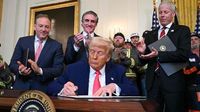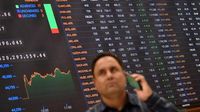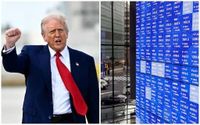April 9, 2025, has marked a tumultuous day in global financial markets, as Asian stock exchanges reacted negatively to the implementation of new "reciprocal tariffs" imposed by the United States, particularly targeting China with an unprecedented aggregate rate of 104%. Tokyo's Nikkei index plummeted by 3.93%, closing at 31,714.03 points, while Taiwan's Taiex fell by 5.8%, and the Hong Kong stock exchange dropped 1.6%. Only the Shanghai Composite managed a modest gain of 1.31% amid the turmoil.
The new tariffs, which came into force today, are part of a broader strategy by President Donald Trump, targeting approximately 60 economies with rates varying from 11% to 50%. The direct retaliation against China stunned many, as it marks the highest tariff level seen in recent history. The global market is now grappling with fears of a potential recession in the United States, as rising inflation pressures mount alongside these trade tensions.
In response to the tariffs, the People's Bank of China (PBOC) set the yuan's fixing against the dollar at its lowest point since September 2023, at 7.2066, further complicating the economic landscape. Trump has accused China of manipulating its currency to mitigate the impact of U.S. tariffs, stating, "China is manipulating its currency to offset tariffs."
The fallout from these tariffs has not only shaken Asian markets but has also sent ripples through European exchanges. Following a brief recovery on Monday, European markets opened sharply lower, with the FTSE 100 down by 2.06%, the DAX down 2%, and the CAC40 falling by 2.5%. In Milan, the FTSE MIB index lost 3.1% in early trading, indicating widespread concern among investors.
As markets reacted, major companies felt the heat. Apple, having lost its title as the world's most valuable company, saw its shares plunge over 20%, resulting in a market capitalization drop of more than $700 billion, bringing its value to approximately $2.6 trillion. Microsoft has now taken the lead with a valuation of $2.64 trillion. This shift comes as Apple grapples with the implications of the new tariffs, which will significantly increase costs on iPhones, primarily assembled in China. The company is reportedly planning to shift some production to India, where goods are subject to a 27% U.S. tariff.
Amid these developments, the South Korean government announced a $2 billion support package for its automotive sector, which is particularly vulnerable to the new tariffs. The 25% tariffs imposed by the U.S. have raised alarms within the industry, prompting officials to act swiftly to mitigate potential damage.
In Europe, the EU Commission has prepared a document detailing countermeasures in response to Trump's tariffs, with a vote scheduled for today. The first tranche of these measures is set to take effect on April 15, 2025. Approximately 70 countries are reportedly ready to negotiate with the U.S. in hopes of easing the trade tensions.
European leaders, including Italian Prime Minister Giorgia Meloni, are actively seeking solutions. Meloni has proposed a substantial €25 billion package to support businesses affected by the tariffs. She emphasized the need for a united front in negotiations, stating, "We must work together to ensure our industries are protected."
As the situation develops, it remains uncertain how these tariffs will affect global trade dynamics. Analysts predict that the ongoing trade war could lead to a contraction in global trade volumes, with the Allianz Trade study office estimating a slowdown in world growth to 1.9% in 2025.
In the U.S., Wall Street closed in the red following the announcement of the tariffs, with the Nasdaq down 2.15%, the S&P 500 down 1.47%, and the Dow Jones down 0.84%. The uncertainty surrounding Trump's trade policies continues to weigh heavily on investor sentiment.
Elon Musk, CEO of Tesla, has publicly criticized the tariffs and has attempted to persuade Trump to reconsider the duties, highlighting the potential harm to American companies. Musk referred to Trump's assistant, Peter Navarro, as an "idiot" in a recent social media post, showcasing the growing frustration among some of America's leading business figures.
As the day unfolds, the global financial community is left to ponder the long-term implications of these tariffs. With markets already showing signs of volatility and uncertainty, the potential for further escalations looms large. Investors are now watching closely for any signs of negotiation or compromise that could alleviate some of the economic pressures stemming from this ongoing trade conflict.
In conclusion, the events of April 9, 2025, have not only reshaped the landscape of international trade but have also sparked widespread concern about the future of global economic stability. As countries prepare to react and adapt to these changes, the world watches intently, hoping for a resolution that can restore balance to the increasingly fragile economic environment.









